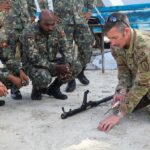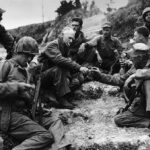
There is a global trend of increased politicization of the military in eroding democracies, some of which are allies of the United States. Risa Brooks joins host Carrie Lee to shed light on the evolving dynamics between political leaders and the military. Brooks discusses the trend of political leaders using the military for their own gain. She emphasizes the importance of military elites resisting this politicization to uphold democratic principles and prevent the military’s use for partisan purposes. The discussion also underscores the crucial role of professional military education in instilling a deep understanding of democratic norms and ethical boundaries in military service. The episode aims to raise awareness about this critical issue and encourage military professionals to uphold their commitment to democratic values.
If you don’t have deep internalization of democratic principles, a military is going to be much more vulnerable to the types of politicization I’ve spoken about.
Podcast: Download
Subscribe: Apple Podcasts | Spotify | Amazon Music | Android | Pandora | iHeartRadio | Blubrry | Podchaser | Podcast Index | TuneIn | Deezer | Youtube Music | RSS | Subscribe to A Better Peace: The War Room Podcast
Risa Brooks is Allis-Chalmers Professor of Political Science at Marquette University, senior fellow at West Point’s Modern War Institute (2017-2020), and a non-resident senior associate in the International Security Program at the Center for Strategic and International Studies. Professor Brooks is the author of Shaping Strategy: The Civil-Military Politics of Strategic Assessment (Princeton University Press, 2008). She is also coeditor (with Lionel Beehner and Daniel Maurer) of Reconsidering American Civil-Military Relations: Politics, Society and Modern War (Oxford University Press) and coeditor (with Elizabeth Stanley) of Creating Military Power: The Sources of Military Effectiveness (Stanford University Press, 2007). She received her Ph.D. from the University of California, San Diego, and her professional experiences include positions as research associate at the International Institute for Strategic Studies and postdoctoral fellow at Stanford’s Center for International Security and Cooperation (CISAC). She has served as associate editor for the academic journals International Security and Security Studies.
Carrie A. Lee is an associate professor at the U.S. Army War College, where she serves as the chair of the Department of National Security and Strategy and director of the USAWC Center on Civil-Military Relations. She received her Ph.D. in political science from Stanford University and a B.S. from MIT.
The views expressed in this presentation are those of the speakers and do not necessarily reflect those of the U.S. Army War College, U.S. Army, or Department of Defense.
Photo Credit: Created by Gemini AI





Regarding the discussion that begins at about the 32:00 point in this podcast:
If we can link the current (and unique here in the U.S.?) politization of the military to the global rise of authoritarianism and to the global decline/erosion of democracy, then can we link the global rise of authoritarianism and the global decline of democracy to the fact that (a) while during the Old Cold War, democracies were seen to be organized, ordered and oriented toward the task of PREVENTING and/or ROLLING BACK unwanted (communist-based in this case) political, economic, social and/or value change, (b) after the Old Cold War, democracies were seen to be organized, ordered, and oriented toward the task of ACHIEVING unwanted (capitalism, markets and trade-based in this case) political, economic, social and/or value change?
Thus, from this perspective of maintaining and/or restoring such things as traditional social values, beliefs and institutions — and, thus, from the perspective of maintaining and/or restoring the power, influence, control, status, privilege, prestige, safety, security, etc., associated with same , democracy came to be seen as the enemy?
Politicization not politization. Apologies.
From the introduction to our article above:
“If you don’t have deep internalization of democratic principles, a military is going to be much more vulnerable to the types of politicization I’ve spoken about.”
Or, stated more as to the matters that I present in my initial comment above:
If you have deep internalization of democratic principles — but have an equal to and/or greater internalization of principles relating to certain other of today’s threatened-by-democracy traditional social values, beliefs and institutions — then these such conflicted military (etc.) personnel, they, indeed, are going to be much more vulnerable to the politicization that Dr. Brooks points to in this podcast?
A possibly different argument:
First, let’s look to the title of our podcast above, which is, “Norms, Politicization and the Military Profession.”
Next, re; “norms”, let’s consider that the decline and/or weakening of long-held norms, customs and established structures within societies (for example, both democracy and an apolitical military norms with certain societies); let’s consider that these such declines in societal norms are often found — today as in the past — not just in “developing” nations, but in the “developed” world also; this, due to such things as globalization, modernization and/or demographic change.
From this such perspective, one might be tempted to say that the erosion of democracies, and the erosion of apolitical militaries also, these (a) WERE NOT CAUSED one by the other (one version of this argument I have made in my initial comments above) but, rather, (b) ARE CAUSED by “outside forces” (for example, by such things as globalization, modernization and/or demographic change).
But is this a credible alternative argument; this, given that the determination to embrace/to “go with” — rather than to “stand hard against” — such things as globalization, modernization and/or demographic change — this/these such determinations were (a) consciously made by the democratic countries and, thus, (b) could not have proceeded without these such conscious decisions, determinations and related actions?
(In fairness to those nations that made conscious decisions, determinations and related actions — to embrace rather than to stand hard against such things as globalization, modernization and/or demographic change — in fairness to these such folks, should we not admit that they believed, at the time, that THEY HAD TO DO THIS; this, for national security reasons? [In this regard, if they did not, and their opponents did, then they would quickly “lose?”)
Thus, if we wish to lament, to understand and/or to assign blame for the massive threat to and/or destruction of “norms” today — such as the norm of democracy and/or the norm of an apolitical military — then, as to these such objectives, do we really need to look any further than to (a) the exceptionally well-known destroyers of norms, such as globalization, modernization and/or demographic change and to (b) the decisions made by democracies; this, to embrace, rather than to stand hard against, such things as globalization, modernization and/or demographic change? (Self-destruction, thus, of norms on a grand scale?)
Our US Department of Defense has already been politicized. These two PhD’s should have already called out the pseudo-science of “Implicit Bias” as reason for Diversity, Equity and Inclusion. Actually, DEI could stand for Didn’t Earn It or Discrimination, Extremism and Intolerance.
Shifting Sands: Report IV: Zombie Psychology, Implicit Bias Theory, and the Implicit Association Test by David Randall Warren Kindzierski and Stanley Young
https://www.nas.org/reports/shifting-sands-report-iv/full-report
Also, we have this resource.
Neutering the CIA: Why US Intelligence Versus Trump Has Long-Term Consequences by John A Gentry